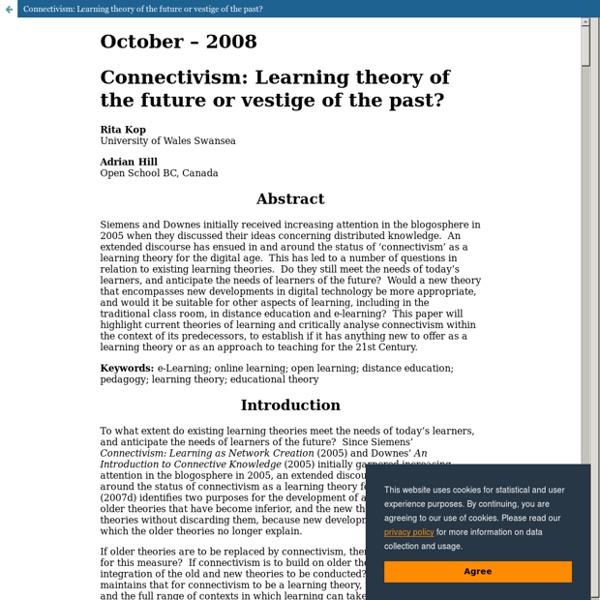An Introduction to Connective Knowledge ~ Stephen's Web ~ b
You are not logged in. [] [] Revised and Updated (minor corrections and typos only) and placed in MS-Word Document form, November 27, 2007. Click here . The version that follows below is the original (uncorrected) version).
Connectivism
History[edit] Connectivism was introduced in 2005 by two publications, Siemens’ Connectivism: Learning as Network Creation and Downes’ An Introduction to Connective Knowledge. Both works received significant attention in the blogosphere and an extended discourse has followed on the appropriateness of connectivism as a learning theory for the digital age. In 2007 Kerr entered into the debate with a series of lectures and talks on the matter, as did Forster, both at the Online Connectivism Conference at the University of Manitoba.[6] In 2008, in the context of digital and e-learning, connectivism was reconsidered and its technological implications were discussed by Siemens' and Ally.
El diálogo y el conectivismo: Un nuevo enfoque para la comprensión y la promoción de un diálogo rico en aprendizaje en red
Special Issue - Connectivism: Design and Delivery of Social Networked Learning Andrew Ravenscroft Learning Technology Research Institute (LTRI), London Metropolitan University, UK Abstract Connectivism offers a theory of learning for the digital age that is usually understood as contrasting with traditional behaviourist, cognitivist, and constructivist approaches.
What Connectivism Is
Posted to the Connectivism Conference forum (which hits a login window - click 'login as guest' (middle of the left-hand column) - I'm sorry, and I have already complained to the conference organizer). At its heart, connectivism is the thesis that knowledge is distributed across a network of connections, and therefore that learning consists of the ability to construct and traverse those networks. It shares with some other theories a core proposition, that knowledge is not acquired, as though it were a thing. Hence people see a relation between connectivism and constructivism or active learning (to name a couple). Where connectivism differs from those theories, I would argue, is that connectivism denies that knowledge is propositional. That is to say, these other theories are 'cognitivist', in the sense that they depict knowledge and learning as being grounded in language and logic.
La Revista Internacional de Investigación en Educación Abierta ya Distancia
Special Issue - Connectivism: Design and Delivery of Social Networked Learning Terry Anderson and Jon Dron Athabasca University, Canada Abstract This paper defines and examines three generations of distance education pedagogy. Unlike earlier classifications of distance education based on the technology used, this analysis focuses on the pedagogy that defines the learning experiences encapsulated in the learning design. The three generations of cognitive-behaviourist, social constructivist, and connectivist pedagogy are examined, using the familiar community of inquiry model (Garrison, Anderson, & Archer, 2000) with its focus on social, cognitive, and teaching presences.
Recent Work in Connectivism
Since the introduction of connectivism as a learning theory in 2004 a body of literature has developed both offering criticisms and expanding on applications and empirical validation. This article surveys recent literature on the topic, grouping it into themes, and developing an understanding of current perspectives in connectivism. It surveys current perspectives and criticisms of connectivism, views of connectivism as a pedagogy and as a theory of learning, recent evidence supporting connectivism, and a wider understanding of connectivism as it is developing today. Abstract in French Depuis l’introduction du connectivisme en tant que théorie de l’apprentissage en 2004, un corpus de littérature a été développé, offrant à la fois des critiques et une extension des applications et une validation empirique. Cet article examine la littérature récente sur le sujet, en le regroupant par thèmes et en développant une compréhension des perspectives actuelles en matière de connectivisme.
Conectivismo: Su lugar en la investigación de la teoría del conocimiento y la innovación en la tecnología habilitada para el aprendizaje
Special Issue - Connectivism: Design and Delivery of Social Networked Learning Frances Bell University of Salford, United Kingdom Abstract The sociotechnical context for learning and education is dynamic and makes great demands on those trying to seize the opportunities presented by emerging technologies.
A través de la puerta abierta: Cursos Abiertos como la investigación, el aprendizaje y compromiso (EDUCAUSE Review
© 2010 Dave Cormier and George Siemens. The text of this article is licensed under the Creative Commons Attribution License ( EDUCAUSE Review, vol. 45, no. 4 (July/August 2010): 30-39 Dave Cormier (dave@edactive.ca) is a web projects lead at the University of Prince Edward Island, cofounder of Edtechtalk, and president of Edactive Technologies, a social software consulting firm.
¿Cuál es la idea única en Conectivismo? «Conectivismo
This site has been created to foster discussion on how our thinking, learning, and organizational activities are impacted through technology and societal changes. Since the original publication of Connectivism: A Learning Theory for the Digital Age, I've been approached by many people requesting additional thinking and discussion. Four tools are available to provide dialogue: Blog for my personal reflective thoughtsWiki for collaborative content creationDiscussion forums for discussion on issues impacted by a connectivist view of learningEmail list for discussions on technology, networks and learning Most resources on this site are intended for public viewing, but contributing to the wiki or discussion forums requires registration.
Conectivismo: Una teoría del aprendizaje para la era digital
Editor’s Note: This is a milestone article that deserves careful study. Connectivism should not be con fused with constructivism. George Siemens advances a theory of learning that is consistent with the needs of the twenty first century. His theory takes into account trends in learning, the use of technology and networks, and the diminishing half-life of knowledge. It combines relevant elements of many learning theories, social structures, and technology to create a powerful theoretical construct for learning in the digital age.



